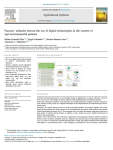Granado-Díaz R., Colombo S., Romero-Varo M., Villanueva A.J. (2024). Farmers' attitudes toward the use of digital technologies in the context of agri-environmental policies. Agricultural systems, 01/12/2024, vol. 221, p. 104129.
https://doi.org/10.1016/j.agsy.2024.104129
https://doi.org/10.1016/j.agsy.2024.104129
| Titre : | Farmers' attitudes toward the use of digital technologies in the context of agri-environmental policies (2024) |
| Auteurs : | R. Granado-Díaz ; S. Colombo ; M. Romero-Varo ; A.J. Villanueva |
| Type de document : | Article |
| Dans : | Agricultural systems (vol. 221, December 2024) |
| Article en page(s) : | p. 104129 |
| Langues : | Anglais |
| Langues du résumé : | Anglais |
| Catégories : |
Catégories principales 6.4 - Production Agricole. Système de ProductionThésaurus IAMM SYSTEME DE PRODUCTION ; AGRICULTURE NUMERIQUE ; POLITIQUE AGRIENVIRONNEMENTALE ; COMPORTEMENT DES AGRICULTEURS |
| Résumé : | CONTEXT Environmental policies are increasingly relying on digitalization to improve efficiency. However, there is still a lack of knowledge on farmers' attitudes toward digitally-based environmental policies. OBJECTIVE This paper contributes to the literature by providing quantitative insights on farmers' attitudes in such contexts, focusing on the use of digital technologies for the implementation of results-based agri-environmental policy. METHODS The analysis focuses on the case study of the implementation of innovative, digitally- and results-based agri-environment and climate schemes in two Mediterranean agri-systems: Mediterranean oak savannah (dehesa) and sloping olive groves (SOG). The assessment relies on a latent class analysis using survey data from a large sample of southern Spanish farmers. In addition, a Step-3 model was used to identify determinants of farmers' class membership. RESULTS AND CONCLUSIONS The results show a high degree of heterogeneity in farmers' attitudes, with three different classes of farmers identified: proactive, skeptical, and reluctant farmers (membership probability of 0.62, 0.25, and 0.13, respectively), basically showing positive, mixed, and negative attitudes toward using digital technologies in environmental policies. Class belonging is determined by farm and farmer characteristics (especially the farm's main agri-system, family labor use, and farmer's education level and age), farmer attitudes (toward environmental results and their certification), and specific agri-system features (economic dependence). SIGNIFICANCE The results are useful for better tailoring digitally-based agri-environmental policies; the diverse costs and benefits that different farmers can expect from the introduction of digital technologies in policy implementation and monitoring should be carefully considered. |
| Cote : | Réservé lecteur CIHEAM |
| URL / DOI : | https://doi.org/10.1016/j.agsy.2024.104129 |







